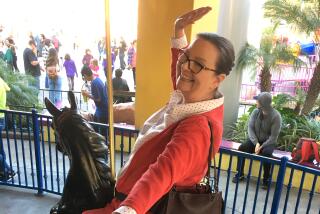Teaching Physicians Palliative Care
- Share via
* Huge applause for Suzanne Gordon’s article (Commentary, Oct. 10) on why American doctors allow their dying patients to suffer so horrendously, abandoning the terminally ill (and their families) to a remaining time of intolerable pain, exhaustion and unspeakable depression. But Gordon was far too civil, suggesting that medical schools do not teach palliative care, and that most physicians are as ignorant as their patients.
Gordon got to the heart of the matter when she wrote, “Studies show that residents aren’t rewarded for showing concern about the physical and emotional suffering of patients with incurable illnesses.” Reward. Does that mean money? Most definitely.
Now consider: Who rewards physicians with money? Insurance companies. If insurance companies paid for compassionate and comprehensive treatment of the dying, doctors would get real compassionate real fast. Why not charge physicians who ignore or treat indifferently dying patients with a felony, namely gross malpractice?
Only when malpractice insurance premiums and claims become more costly than even a year of administering to a dying patient will dying patients be cared for in a manner befitting a human being.
T.M. THOMAS
Studio City
* Having just gone through my wife dying of cancer, I know from personal experience exactly what Gordon is talking about. If ever there is an area of modern medicine that is almost totally mishandled by our doctors, this is it.
Doctors must learn not only to lessen pain and counsel with the dying person, but also to instruct the surviving spouse about what to expect, how to deal with it, and to take advantage of the hospice programs now available to us.
RICHARD J. ARTHUR
Rowland Heights
* I would like to sing the praises of Kaiser Permanente’s hospice program. The participants of this program have well learned the type of treatment that Gordon said was lacking.
My husband died of melanoma cancer on Aug. 9 after being diagnosed in May. What had the potential of being a traumatizing experience ended up being a positive time of caring and communication. The hospice doctor, nurse and music therapist gave my husband and our family a sense of worth and encouragement. They ably prescribed medicine that helped him handle the disease without numbing his mind and gave the family methods of treatment and coping. They monitored his condition, provided necessary oxygen and medical equipment and counseled us in a way that enabled him to attend our daughter’s college graduation and enjoy a quality of life to the end.
I will forever be thankful for their care. Our strong Christian faith and the acceptance of death were undergirded by that staff, enabling us to live life to the fullest in spite of the disease.
SHERLEE MILLER
La Canada






